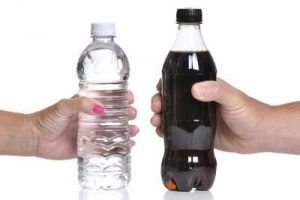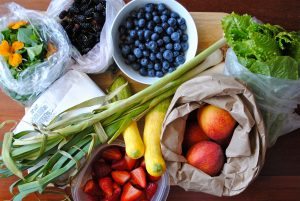30 Simple Health Tips to Try Each Day of June
1. Reduce serving size a little
If you think leaving just a little something on your plate won’t matter, think again. It will. Small amounts of uneaten food add up to calories that stay on the plate – not on you.
2. Sip while sitting.
Bring a cup or bottle of water with you whenever you sit (at your desk, in the car or in front of the TV, for example). Although moving is better than sitting, at least you’ll be performing a healthy habit when at rest.
3. Move about more.
Take the stairs, park a few blocks away or otherwise become inefficient and take extra steps to get where you need to go.
4. Have a vegetable at breakfast.
Most people save their veggies for dinner, but it’s healthful to think outside the cereal bowl and veg out at breakfast. For example, add a sliced tomato to your cheese sandwich or some mushrooms to your eggs.
5. Find fiber.
Whether it’s a bran cereal, nuts, oatmeal or an array of other fiber-filled foods, added fiber can make you feel fuller longer and provide a, well, moving experience.
6. Flip the package over.
Read nutrition labels to see what’s really in your food. Don’t be fooled by a flashy front-of-package claim.
7. Don’t fear fat – but don’t go overboard.
Fat has more calories than other nutrients, but it has multiple benefits. If you watch your portions, you can enjoy its decadence.
8. Don’t have guilt as a side dish.
If you overindulge at a meal, move on.
9. Eat Avocados
They’re rich in monounsaturated fat and vitamin E, both of which promote healthy skin. Try them on salads and sandwiches, and even in smoothies.
10. Pick plants.
Protein derived from plant sources such as seeds, nuts, tofu and tempeh, as well as from grains, can help lower cholesterol, improve your heart health and add a satiating blend of flavors to extend Meatless Monday to the rest of the week.
11. Tap into your dark side.
Dark chocolate has been shown to have heart-healthy benefits and it can certainly boost your mood. Be mindful of portions, though, to help keep yourself feeling happy.
12. Eat healthy.
Enjoy.
13. Take time for tea.
Tea contains polyphenols, it’s good for your bones and it provides a soothing cup of comfort in any season.
14. Cook with your kids.
Don’t think of this interaction as cooking lessons. Rather, realize that teaching your kids to put together a meal is a lesson they can use for the rest of their lives.
Replace salt with lemon, herbs and spices.
16. Eat when you eat.
Try not to do simultaneous activities such as typing, watching TV or driving when you eat. You’ll appreciate each bite even more.
The more hours you’re awake, the more time you have to nosh. Lack of zzz’s can also mess with your hormone levels.
18. Be good to your gut.
Include Greek yogurt, sauerkraut, kefir or foods high in fiber in your diet.
19. Make healthy swaps.
For instance, try mashed avocado instead of butter or use whole-wheat pastry flour in place of white, refined types.
20. Go nuts.
Nuts add crunch and decadent flavor to salads, veggie dishes, yogurt and even sandwiches via nut butters. Nuts can help reduce cholesterol levels and stabilize blood glucose levels.
21. Indulge without bulge.
Comfort foods in the right amounts and at the right times will provide what you’re looking for – comfort. Excessive amounts could lead to discomfort and unnecessary weight gain. Avoid portion distortion.
22. Chill out.
Frozen foods, particularly fruits and veggies, can be just as nutritious as fresh produce and, in some cases, they may be even better.
23. Have a superfood.
Most superfoods can be found in the produce aisle – they’re not fancy and they don’t even wear food labels. Add a fruit or veggie to each meal.
24. Share a meal.
Try ordering your own appetizer but split the main dish with a friend.
25. Get big on beans.
Beans are the most undervalued food in the supermarket. They are inexpensive, easy to store, rich in protein and fiber, and taste so good. Add some to your soup tonight.
26. Do something.
Don’t call it exercise – call it fun. Dance, ride a bike, take the dog for a long walk or just climb the steps in your home or apartment.
27. Cook someone a meal.
There’s no better way to show you care than to make the effort to cook for somebody you care about.
28. Keep a food diary.
Most people don’t realize how much they really consume in a day. If you write it down, the amount you eat may surprise you.
29. Make snacks count.
Be sure your snack consists of protein, whole grains and healthy fat for the trifecta that will keep you feeling fuller longer.
30. Be kind to yourself.
If you’re not having a great day, don’t “reward” yourself with food – the wrong foods in the wrong amounts may become punishments instead of rewards. Take a bath, write a letter, surround yourself with true friends or buy yourself something that will make you smile. You deserve to have a wonderful month – and a fabulous rest of the year.
Eat mindfully. Sometimes when we think we are hungry, our real need is just a large glass of water. We will eat less when we have adequate hydration. Caffeinated drinks, such as soft drinks, contain additives and interfere with our body’s ability to rid itself of toxins. Pay attention to what we are eating. Ask yourself if you really are hungry or if something else is going on that’s causing you to turn to food.
When we want to lose weight, lets forget the word DIET. Reverse the letters in the word and EDIT what we eat. Make it a lifestyle change toward healthier foods. There are so many healthy foods that taste good
Water vs Soda

There’s a reason nutrition experts recommend drinking at least 8 glasses of water per day while limiting soda — or better yet, avoiding it altogether. Water is calorie-free and hydrating and the benefits are priceless. Soda is loaded with sugar and calories, but does nothing for your health except affect it negatively. While the sweetness of the carbonated beverage may be enticing, ditch the soda pop and reach for water instead.
Staying Hydrated
Throughout the day, you lose about 8 cups of water from your body. If you don’t replace this lost water, it can lead to dehydration, which presents as thirst, headaches, dizziness, drowsiness, nausea, vomiting, muscle cramps and dry mouth. Soda does not replace the water you lose, and caffeinated sodas can actually make dehydration worse by increasing urine production. A 12-ounce can of caffeinated soda contains 45 milligrams of caffeine — about half that found in an 8-ounce cup of coffee. If you do drink soda, drink an extra glass of water for every can of soda.

Eat foods that are closest to their natural state as possible. Eat whole, fresh foods in a rainbow of colors.
